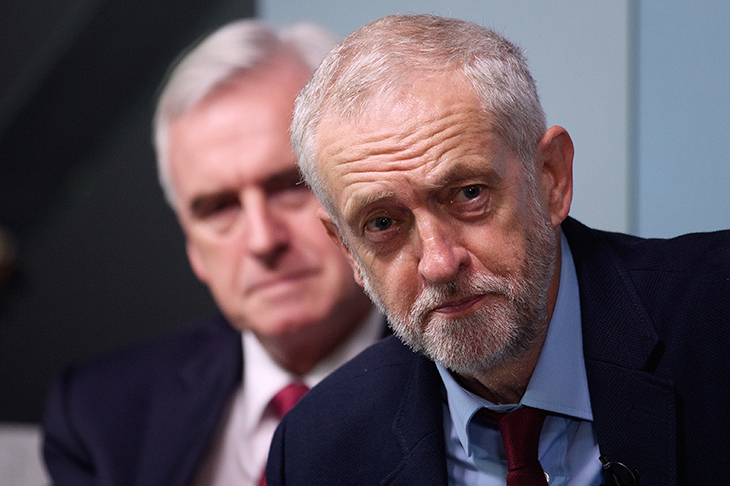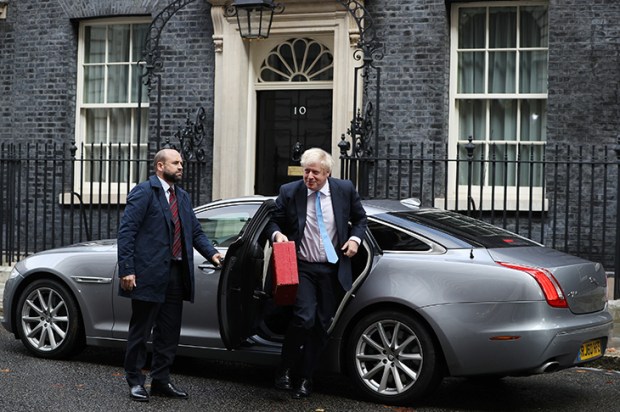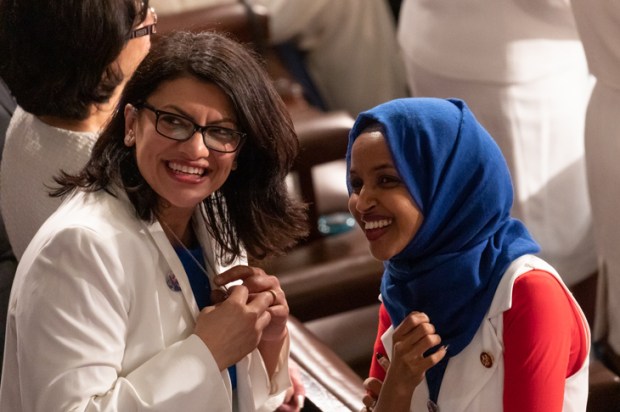In the days before the election, senior Labour people were already discussing how to replace Jeremy Corbyn should the party fail to win enough seats to form a government. With the polls pointing to a Tory majority, it was inevitable that the conversation would turn to succession.
Of course, we’ve been here before. In 2010, several members of Gordon Brown’s cabinet had leadership bids ready to go, only to shelve them when the exit poll predicted a hung parliament. In 2017, too, with Labour predicted to be on course for failure, leadership talk was rife. A number of ambitious candidates sounded out colleagues and readied themselves to move quickly. It didn’t come to pass — but as was the case then, this time around Labour figures are taking no chances.
A succession plan is being sketched out to deal with the eventuality of Corbyn crashing and burning. The fast-track route being mooted involves a swift resignation from Corbyn. Then, under a plan discussed by union officials, John McDonnell would step in as interim leader, allowing for a full-blown leadership contest in 2020.
Should Labour face a defeat, not all the party’s MPs will be thrilled at the prospect of continuity Corbynism in the guise of McDonnell being at the helm indefinitely. But, thanks to a change in the rules in the autumn, it is up to the national executive committee to appoint any interim leader — and that committee is firmly weighted in favour of Corbynism. With Tom Watson bowing out at this election, no deputy leader is around to step in.
There are two reasons why delaying a leadership contest until autumn next year is thought to be in the interests of the Corbyn wing. The first is that holding the contest immediately after a heavy defeat could help those candidates promising a break from Corbynism. The second is that none of the candidates favoured by Corbyn and McDonnell is quite ready for primetime. They would benefit from a shadow cabinet reshuffle and the chance to prove themselves in more high-profile jobs. Think of how Michael Howard promoted David Cameron and George Osborne in 2005.
Two candidates who could benefit from an early race are Emily Thornberry and Keir Starmer. They have been rather quiet over the course of the election campaign — or, to quote one party aide, have been ‘sidelined’. The leadership has largely sent only the most loyal shadow ministers on to the airwaves. ‘It’s an arrangement that suits both sides,’ says an insider. Those in the party’s upper echelons view Thornberry and Starmer as too Remain and metropolitan to appeal to voters behind the crumbling red wall. Meanwhile, should a race begin, the two could find it useful not to have been recently made to defend the party’s record on anti-Semitism.
If she stands, Thornberry could pitch herself as a loyal Corbyn supporter keen to move the party closer to the membership’s pro-EU stance, while taking a tougher stance on anti-Semitism. Among some Labour MPs, Starmer is seen as the great hope. He has impressed over the past two years with his work both in the Commons and behind the scenes evolving the party’s Brexit position.
But Starmer faces two obstacles. Firstly, he is a man. Pressure is mounting to ensure the next full-time leader is female, which would finally allow Labour to shake off the unenviable tag of being the only mainstream British party never to have been led by a woman. Second, some Labour MPs worry Starmer can be wooden. ‘I don’t know if he emotionally connects with people,’ says one.
Neither Starmer nor Thornberry would be McDonnell’s first pick. Of the candidates more likely to continue the spirit of Corbynism, Rebecca Long-Bailey is seen as McDonnell’s protégé and the heir apparent. Were he to move in as an interim leader, she is tipped to become shadow chancellor. A sign of her closeness to the leadership can be found in the fact she has an office close to McDonnell and Corbyn in the Norman Shaw building of parliament. It was given to her when she was appointed shadow chief secretary to the treasury, and she retained it even when she moved brief. A docker’s daughter from Manchester, Long-Bailey is a proud socialist and a loyal ally to Corbyn and McDonnell. During the election campaign, she was given the task of representing Labour in the BBC’s seven-party debate.
Another name that comes up in leadership conversations is Angela Rayner. She has a striking backstory: leaving school at 16 with no qualifications to have her first child; later going back into education and becoming a care worker. In this campaign, she seems to have been laying the groundwork to pitch herself as a Kinnock-esque figure. If she enters the leadership fray, she may present herself as someone who sits on the left but who nonetheless understands the need for reform. However, Rayner is close to Long-Bailey — they share a flat — and there is a chance that only one of them would stand.
If Long-Bailey and Rayner are viewed as keepers of the Corbynism flame, there is one candidate who would do so in a more radical way: Laura Pidcock. The MP for North West Durham shot to notoriety when she gave an interview saying she would never be friends with a Tory. Pidcock is an avid Corbyn supporter — she even expressed solidarity with Chris Williamson, the former MP suspended in an anti-Semitism row. Her first stumbling block, though, might simply be her parliamentary seat, where she could be in deep water — or, at the very least, have her majority of 8,792 reduced to a low-enough margin to make MPs nervous about her candidacy.
There are also dark horses in the race, including Jess Phillips who is being talked up as the candidate best equipped to represent the moderate wing of the party.
Given what happened in 2010 and 2017, we may be getting ahead of ourselves here. Yet in recent months Labour’s leadership has behaved in a way that suggests they are preparing for defeat as much as for victory. If things don’t go to plan on election night, a battle for the soul of the party will get under way. No side wants to be left behind.
Got something to add? Join the discussion and comment below.
Get 10 issues for just $10
Subscribe to The Spectator Australia today for the next 10 magazine issues, plus full online access, for just $10.
You might disagree with half of it, but you’ll enjoy reading all of it. Try your first month for free, then just $2 a week for the remainder of your first year.















Comments
Don't miss out
Join the conversation with other Spectator Australia readers. Subscribe to leave a comment.
SUBSCRIBEAlready a subscriber? Log in